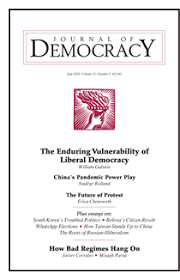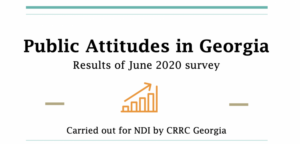 What will be COVID-19’s longer-term impact on democracy? Recent research points to the causal pathways that can lead to democratic breakdown — as a result of the global economic fallout from the pandemic, according to Michigan State University’s Cristina Bodea and Christian Houle. In many countries, the economic crisis is likely to generate additional income inequality and reduce social mobility — which in turn can increase people’s support for authoritarian values and reduce access to political representation, they write for The Post’s Monkey Cage blog.
What will be COVID-19’s longer-term impact on democracy? Recent research points to the causal pathways that can lead to democratic breakdown — as a result of the global economic fallout from the pandemic, according to Michigan State University’s Cristina Bodea and Christian Houle. In many countries, the economic crisis is likely to generate additional income inequality and reduce social mobility — which in turn can increase people’s support for authoritarian values and reduce access to political representation, they write for The Post’s Monkey Cage blog.
 Despite its role in covering up the outbreak of the COVID-19 pandemic, China’s ruling Communist Party is aggressively disseminating pro-Beijing narratives abroad and maneuvering within international institutions, analyst Nadège Rolland writes in the latest issue of the NED’s Journal of Democracy.
Despite its role in covering up the outbreak of the COVID-19 pandemic, China’s ruling Communist Party is aggressively disseminating pro-Beijing narratives abroad and maneuvering within international institutions, analyst Nadège Rolland writes in the latest issue of the NED’s Journal of Democracy.
Polling by the National Democratic Institute (NDI) shows that the overwhelming majority of Georgians (73 percent) credit the government and public health experts with managing the crisis effectively, and turn to them for reliable information (85 percent and 90 percent, respectively). Swift and evidence-based government action on COVID-19 has built public trust on these issues. Journalists (73 percent), local government (66 percent), and religious leaders or the church (61 percent) are also trusted sources, writes NDI’s Andriy Shymonyak.
The poll, conducted in partnership with the Caucasus Research Resource Center (CRRC-Georgia). Contook a close look at citizens’ perspectives on the ongoing COVID-19 pandemic and the information ecosystem:
 While most Georgians are concerned about the quality of information around the COVID-19 pandemic, the majority (60 percent) remain confident in their ability to discern what is true and what is false. Indeed, when presented with some prevalent disinformation narratives, significant numbers of Georgians disagreed with the statements, such as that the EU has abandoned its members (54 percent disagree), the Richard Lugar Public Center for Public Health Research (Lugar Lab) develops biological weapons against Russia (60 percent disagree), and 5G is linked to the spread of COVID-19 (45 percent disagree).
While most Georgians are concerned about the quality of information around the COVID-19 pandemic, the majority (60 percent) remain confident in their ability to discern what is true and what is false. Indeed, when presented with some prevalent disinformation narratives, significant numbers of Georgians disagreed with the statements, such as that the EU has abandoned its members (54 percent disagree), the Richard Lugar Public Center for Public Health Research (Lugar Lab) develops biological weapons against Russia (60 percent disagree), and 5G is linked to the spread of COVID-19 (45 percent disagree).
 Of importance, however, is that while few Georgians believe these statements, roughly a third don’t know whether they are true or false, pointing to disinformation’s ability to confuse.
Of importance, however, is that while few Georgians believe these statements, roughly a third don’t know whether they are true or false, pointing to disinformation’s ability to confuse.
Authoritarian governments are using the outbreak of Covid-19 to silence critics, said a recent open letter signed by more than 500 former world leaders and Nobel Laureates. The pandemic poses serious threats to democracy, according to “A Call to Defend Democracy”, an Open Letter initiated by the Stockholm-based International IDEA and the US-based National Endowment for Democracy. The letter is signed by some 73 pro-democracy institutions as well as a roll call of global political and civic leaders, including 13 Nobel Laureates and 62 former heads of state and government.







